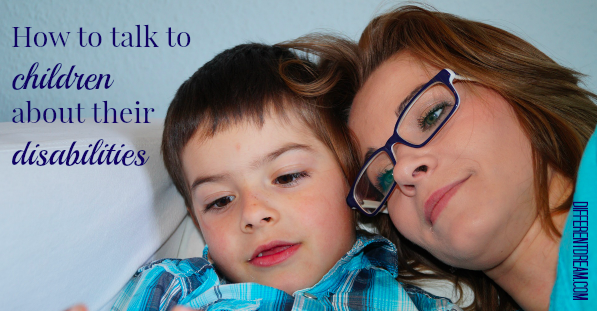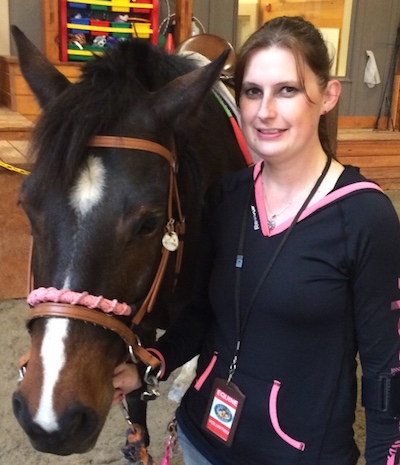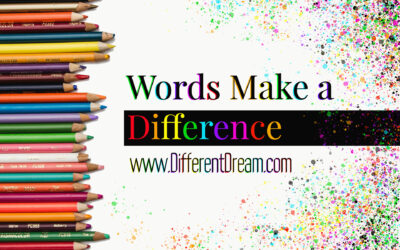How to Talk to Children About Their Disabilities

Guest blogger Trish Shaeffer is at Different Dream to explain how to talk to children about their disabilities. Her ideas have been field tested on her own boys with whom she says she’s “100% honest so it’s not a shock to them in later life.
We’ve all been there as parents. When our little ones with disabilities realize what is going on in their world and how different they are from others, the questions will come pouring out. Why? When? How? What’s that?
No matter what age our children are, we have to answer their questions regarding the giant elephant in the room. If they have siblings, we have to answer their questions depending on a child’s chronological or development age. The talk about a child’s disability doesn’t have to be a formal, one-time-only, high-pressure sit-down event. Instead, make it part of everyday conversations and share information on your child’s timetable.
As a mom of three boys, with twins who have unique and different medical conditions and disabilities, I have answered their questions. I simplify things and change the way I answer depending on their ages and developmental delays. For instance, my neuro-typical 9-year-old will understand more than the one twin who is 5. And his twin with the developmental delay of a 2-year-old, will understand less. Changing the way I answer the same question depending on their circumstances helps so much.
For example, the developmental delayed twin will get the answer, “Your legs do not work right.” His twin and older brother may get the response, “Your brother was born with a condition that makes it hard for his legs to work.” With the 9-year-old, I go into more detail about cerebral palsy and how it effects people differently. When my one 5-year-old asks what autism is I may say, “People with autism look and feel the world differently, but they like the same things as you.”
In addition to these examples. these guidelines can help you educate your children about these issues regardless of age or disability.
- Start small. Don’t share information in one big dump. From the very start, give your child a name for the condition that makes some stuff harder and some stuff special. For very young kids, you can introduce a storybook element or a stuffed animal with a name like that diagnosis that your child must tame or battle.
- Tell stories. Find children’s books about your child’s disability. Books can provide good language to explain a complicated disorder and to show that others have the same issues.
- Find role models. Knowing other people with the same disability makes the diagnosis much less spooky and isolating. It can be valuable for your child to spend time with other kids with special needs. And other special needs children can provide more answers.
- Work as a team. All family members should work as a team and provide the same information so as not to confuse your child. Mixed signals are worse than no signals at all.
- Accentuate the positive. Though you may wish your child didn’t have to deal with disability. But do not describe it as a tragedy. Children living with disabilities know what’s hard and need parents to shine a light on the brighter side. But be sure to discuss strengths and weaknesses, abilities and disabilities.
- Follow your child’s lead. Some kids may have questions earlier than others. Some may seek only a simple definition and others may want more in depth answers. Every child and every family is different, and there’s no one right way to do this. Keeping lines of communication open and the topic out in the light will make sure that whatever your child wants to talk, you’ll be ready.
- Watch shows with characters who have disabilities. Shows that feature characters with special needs can be a good way to get a conversation started with your child.
- Locate helpful websites. Forums for parents of kids with your child’s disability are a good place to see how others have handled the telling and to locate resources. Sites for children with specific disabilities can also be helpful. Older kids might appreciate forums and email lists where they can communicate with kids with similar issues.
Best wishes as you talk to your child. Remember, let the light and positivity in as you share a great moment with your children. Bond with them over the conversation about their disability and find strength in each other.
Do you like what you see at DifferentDream.com? You can receive more great content by subscribing to the quarterly Different Dream newsletter and signing up for the daily RSS feed delivered to your email inbox. You can sign up for the first in the pop up box and the second at the bottom of this page.

By Trish Shaeffer
Trish Shaeffer mom of 3 active boys, a 9-year-old and 5-year-old twins who were born 2 months early and have special needs. She’s a peer supporter for Parent to Parent and volunteers with the United Cerebral Palsy Network, Special Olympics, and the United Way. She’s also an equine volunteer at Leg Up Farm. She’s married to her best friend and biggest supporter, Chris Shaeffer.
Subscribe for Updates from Jolene
Related Posts
We Need Community while Parenting Kids with Disabilities and Special Needs
Sandy Ramsey-Trayvick explains how we need community while parenting kids with disabilities and special needs.
The Impact our Words May Have on the Children We Serve
With narratives from her past, Jolene demonstrates the impact our words may have on the children we serve.
Unexpected Grace Given and Received by Caregiving Parents
Looking at her difficulties differently led Karen Wright to experience the unexpected grace given and received by caregiving parents.






0 Comments